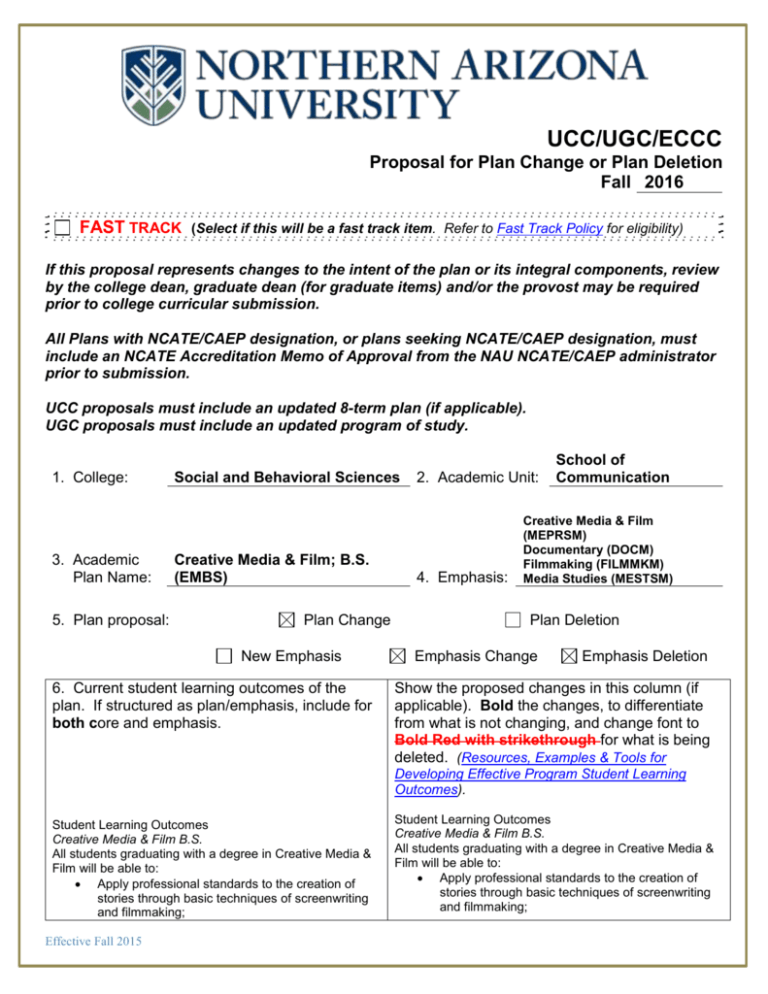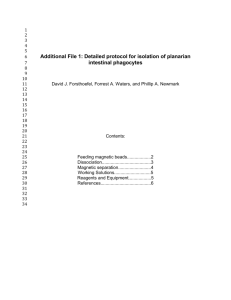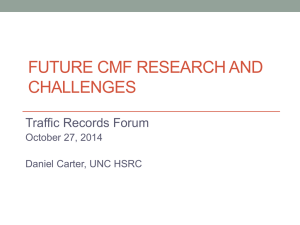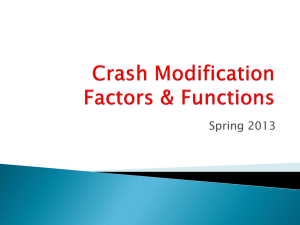Creative Media & Film BS - www7
advertisement

UCC/UGC/ECCC Proposal for Plan Change or Plan Deletion Fall 2016 FAST TRACK (Select if this will be a fast track item. Refer to Fast Track Policy for eligibility) If this proposal represents changes to the intent of the plan or its integral components, review by the college dean, graduate dean (for graduate items) and/or the provost may be required prior to college curricular submission. All Plans with NCATE/CAEP designation, or plans seeking NCATE/CAEP designation, must include an NCATE Accreditation Memo of Approval from the NAU NCATE/CAEP administrator prior to submission. UCC proposals must include an updated 8-term plan (if applicable). UGC proposals must include an updated program of study. 1. College: 3. Academic Plan Name: 5. Plan proposal: Social and Behavioral Sciences Creative Media & Film; B.S. (EMBS) Plan Change New Emphasis 6. Current student learning outcomes of the plan. If structured as plan/emphasis, include for both core and emphasis. 2. Academic Unit: 4. Emphasis: School of Communication Creative Media & Film (MEPRSM) Documentary (DOCM) Filmmaking (FILMMKM) Media Studies (MESTSM) Plan Deletion Emphasis Change Emphasis Deletion Show the proposed changes in this column (if applicable). Bold the changes, to differentiate from what is not changing, and change font to Bold Red with strikethrough for what is being deleted. (Resources, Examples & Tools for Developing Effective Program Student Learning Outcomes). Student Learning Outcomes Creative Media & Film B.S. All students graduating with a degree in Creative Media & Film will be able to: Apply professional standards to the creation of stories through basic techniques of screenwriting and filmmaking; Effective Fall 2015 Student Learning Outcomes Creative Media & Film B.S. All students graduating with a degree in Creative Media & Film will be able to: Apply professional standards to the creation of stories through basic techniques of screenwriting and filmmaking; Analyze, write, critique, and discuss the cultural, historical, and theoretical forces shaping regional, national, and international media, including works of creative media, client work, documentaries, and film; and Develop and revise their work based on faculty and peer critiques and audience responses, culminating in final projects that may include fiction, documentary, or client-based films. Creative Media Production Emphasis Graduating students will be able to: Refine their skills in shooting, sound recording, editing, and sound design in a variety of projects; Research, plan, write, produce, budget, bid, shoot, edit, and promote client-based projects in a variety of styles; and Design a video production house business model, including finding clients, and discovering, promoting, and creating their stories, as well as drawing up contracts and using other business practices, PR work, and/or advertising. Documentary Emphasis Graduating students will be able to: Refine their skills in shooting, sound recording, editing, and sound design in a variety of projects; Research, plan, produce, budget, finance, shoot, edit, and promote documentary projects; Apply skills of reporting—interviewing, gathering information, researching people and ideas for potential documentary stories; Read, write, and discuss the traditions and history of a variety of documentary stories; and Integrate other areas of knowledge, such as from anthropology, women and gender studies, history, and humanities, in order to help students research potential documentary story topics. Filmmaking Emphasis Graduating students will be able to: Refine their skills in shooting, sound recording, lighting, directing, editing, and sound design in a variety of projects; Research, plan, produce, budget, finance, cast, and promote fiction film projects; Create medium and long form fiction scripts; and Examine a variety of foreign and independent film traditions that they can apply to their own film projects. Media Studies Emphasis Graduating students will be able to: Survey a variety of regional, national, and international media forms; Acquire and apply media literacy skills while analyzing a variety of film and other media projects; Examine the various forms of media creation, circulation, and consumption both locally and global; Investigate media consumption through an increased understanding of regional, national, and global media practice; Effective Fall 2015 Analyze, write, critique, and discuss the cultural, historical, and theoretical forces shaping regional, national, and international media, including works of creative media, client work, documentaries, and film; and Develop and revise their work based on faculty and peer critiques and audience responses, culminating in final projects that may include fiction, documentary, or client-based films. Creative Media Production Emphasis Graduating students will be able to: Refine their skills in shooting, sound recording, editing, and sound design in a variety of projects; Research, plan, write, produce, budget, bid, shoot, edit, and promote client-based projects in a variety of styles; and Design a video production house business model, including finding clients, and discovering, promoting, and creating their stories, as well as drawing up contracts and using other business practices, PR work, and/or advertising. Documentary Emphasis Graduating students will be able to: Refine their skills in shooting, sound recording, editing, and sound design in a variety of projects; Research, plan, produce, budget, finance, shoot, edit, and promote documentary projects; Apply skills of reporting—interviewing, gathering information, researching people and ideas for potential documentary stories; Read, write, and discuss the traditions and history of a variety of documentary stories; and Integrate other areas of knowledge, such as from anthropology, women and gender studies, history, and humanities, in order to help students research potential documentary story topics. Independent Filmmaking Emphasis Graduating students will be able to: Refine their skills in shooting, sound recording, lighting, directing, editing, and sound design in a variety of projects; Research, plan, produce, budget, finance, cast, and promote fiction film projects; Create medium and long form fiction scripts; and Examine a variety of foreign and independent film traditions that they can apply to their own film projects. Media Studies Emphasis Graduating students will be able to: Survey a variety of regional, national, and international media forms; Acquire and apply media literacy skills while analyzing a variety of film and other media projects; Examine the various forms of media creation, circulation, and consumption both locally and global; Investigate media consumption through an increased understanding of regional, national, and global media practice; Interpret their own production, circulation and consumption of media both as a reflection of their own culture and in conversation with media users in other cultures; and Engage in meaningful and productive discussion, debate, and open intellectual exchange with others about regional, national, and global media practice. Effective Fall 2015 Interpret their own production, circulation and consumption of media both as a reflection of their own culture and in conversation with media users in other cultures; and Engage in meaningful and productive discussion, debate, and open intellectual exchange with others about regional, national, and global media practice. 7. Current catalog display in this column. Cut and paste the changing text in its entirety, from the current on-line academic catalog: (http://catalog.nau.edu/Catalog/) Creative Media & Film; B.S. Creative Media & Film; B.S. In addition to University Requirements: 51 units of major requirements including 18 units of emphases requirements. Up to 9 units of major prefix courses may be used to satisfy Liberal Studies requirements; these same courses may also be used to satisfy major requirements Elective courses, if needed, to reach an overall total of at least 120 units Please note that you may be able to use some courses to meet more than one requirement. Contact your advisor for details. Minimum Units for Completion 120 Mathematics Required MAT 114 Emphasis, Minor, Certificate Required Fieldwork Experience/Internship Optional University Honors Program Optional Progression Plan Link View Progression Plan Major Requirements Take the following 51 units: COM 101, COM 200 with grades of "C" or better (6 units) CST 111 or TH 125 (3 units) CMF 121, CMF 122, CMF 129, CMF 135 (12 units) Select two from (6 units): o CMF 321 , CMF 322, CMF 382, CMF 482 o COM 400 (CMF 328W or CMF 330W) (3 units) (CMF 426C or CMF 470C) (3 units) Note: CMF 408 Field Experience is highly recommended for all students but not required. Emphasis Requirements (Select one): Creative Media Production Emphasis (18 units) CMF 240, CMF 340 (6 units) CMF 235 or (CMF 251 and CMF 252) (3 units) Select three from (9 units): Effective Fall 2015 Show the proposed changes in this column. Bold the changes, to differentiate from what is not changing, and change font to Bold Red with strikethrough for what is being deleted. In addition to University Requirements: 51 54 units of major requirements including 18 21 units of emphases requirements. Up to 9 units of major prefix courses may be used to satisfy Liberal Studies requirements; these same courses may also be used to satisfy major requirements Elective courses, if needed, to reach an overall total of at least 120 units Please note that you may be able to use some courses to meet more than one requirement. Contact your advisor for details. Minimum Units for Completion 120 Mathematics Required MAT 114 Emphasis, Minor, Certificate Required Fieldwork Experience/Internship Optional University Honors Program Optional Progression Plan Link View Progression Plan Major Requirements Take the following 51 54 units: Core Requirements (33 units): COM 101, COM 200 with grades of "C" or better (6 units) (CST 111 or TH 125) (3 units) CMF 121, CMF 122, CMF 129, CMF 135 (12 units) (CMF 328W or CMF 330W) (3 units) (CMF 426C or CMF 470C) (3 units) Select two from (6 units): o CMF 321 , CMF 322, CMF 382, CMF 482 o COM 400 (CMF 328W or CMF 330W) (3 units) (CMF 426C or CMF 470C) (3 units) Note: CMF 408 Field Experience is highly recommended for all students but not required. CMF 124, CMF 226, CMF 440 ADV 207 COM 402 MGT 399 (Small Business Management & Entrepreneurship) PR 272 Documentary Emphasis (18 units) CMF 106, CMF 235, CMF 336, CMF 438 (12 units) Select two from (6 units): ANT 102, ANT 205, ANT 301, ANT 302, ANT 303, ANT 305, ANT 306 ES 200, ES 202, ES 204, ES 206 HIS 295, HIS 379 JLS 131 HUM 375 WGS 191, WGS 215, WGS 260 Filmmaking Emphasis (18 units) CMF 221 (3 units) CMF 235 or (CMF 251 and CMF 252) (3 units) Select four from (12 units): CMF 229, CMF 325, CMF 329, CMF 335, CMF 337, CMF 435 CINE 267 PHO 100 Media Studies Emphasis (18 units) Select an additional two from (6 units): o CMF 321, CMF 322, CMF 382, CMF 482 CINE 101, CINE 383 (6 units) COM 301 (3 units) Select one from (3 units): CINE 232, CINE 268, CINE 380 COM 323, COM 425 ENG 266 Emphasis Requirements (Select one): Creative Media Production Emphasis (18 units) CMF 240, CMF 340 (6 units) CMF 235 or (CMF 251 and CMF 252) (3 units) Select three from (9 units): CMF 124, CMF 226, CMF 440 ADV 207 COM 402 MGT 399 (Small Business Management & Entrepreneurship) PR 272 Documentary Emphasis (18 21 units) CMF 106, CMF 235, CMF 275, CMF 336, CMF 340, CMF 438 (12 18 units) Select one two from (3 6 units): ANT 102, ANT 205, ANT 301, ANT 302, ANT 303, ANT 305, ANT 306 ES 200, ES 202, ES 204, ES 206 HIS 295, HIS 379 HUM 375 JLS 131, JLS 483 HUM 375 PHO 101 WGS 191, WGS 215, WGS 260 General Electives Independent Filmmaking Emphasis (18 21 units) CMF 221 (3 units) CMF 235 or (CMF 251 and CMF 252) (3 units) Select six four from (12 18 units): CMF 229, CMF 235, (CMF 251 and CMF 252; both as UTV only), CMF 325 275, CMF 329, CMF 335, CMF 337, CMF 435 CINE 267 PHO 100 You may take these remaining courses from any academic areas, using these courses to pursue your specific interests and goals. We encourage you to consult with your advisor to select the Media Studies Emphasis (18 21 units) Select an additional two not used in the core from (6 units): o CMF 321, CMF 322, CMF 382, CMF 482 CINE 101, CINE 383 (6 units) COM 301 (3 units) Select one two from (3 6 units): CINE 232, CINE 268, CINE 380 Additional coursework is required, if, after you have met the previously described requirements, you have not yet completed a total of 120 units of credit. Effective Fall 2015 courses that will be most advantageous to you. (Please note that you may also use prerequisites or transfer credits as electives if they weren't used to meet major, minor, or liberal studies requirements.) Additional Information See the School of Communication page for information about the Communication Core, Advising and Student Responsibilities, and Graduation Requirements. All majors must earn the grade of "C" or better in their freshman composition required course, and their foundation mathematics course. Be aware that some courses may have prerequisites that you must also take. For prerequisite information click on the course or see your advisor. COM 323, COM 425 ENG 266 General Electives Additional coursework is required, if, after you have met the previously described requirements, you have not yet completed a total of 120 units of credit. You may take these remaining courses from any academic areas, using these courses to pursue your specific interests and goals. We encourage you to consult with your advisor to select the courses that will be most advantageous to you. (Please note that you may also use prerequisites or transfer credits as electives if they weren't used to meet major, minor, or liberal studies requirements.) Additional Information See the School of Communication page for information about the Communication Core, Advising and Student Responsibilities, and Graduation Requirements. All majors must earn the grade of "C" or better in their freshman composition required course, and their foundation mathematics course. Be aware that some courses may have prerequisites that you must also take. For prerequisite information click on the course or see your advisor. 8. Justification for proposal: Overall, this change tightens the program and makes it more understandable to students with three emphasis areas: Documentary, Independent Filmmaking, and Media Studies. The creative media production emphasis is being deleted because it lacks enough production classes to make it viable. We decided that students are better served learning about nonfiction client-based work by taking classes in documentary, so we have consolidated CMF 240 Producing Client Work I and CMF 340 Producing Client Work II into one class (CMF 340 Producing Client Work), and placed it into the documentary emphasis. At the same time, it also becomes a strong pre-requisite for the client-based Capstone, CMF 426C Production House Experience. Furthermore, by moving CMF 340 as a requirement in the documentary emphasis it offers two solutions. One, it provides a producing class for the documentary students; and two, it gives Effective Fall 2015 documentary students the knowledge to run their own business as a documentary filmmaker. Much of the production content of CMF 340 utilizes documentary styles for client-based work. In addition, we feel that the junior level postproduction course (CMF 325), needs to be a lower division course that students need to take before moving on to most junior level production classes. However, by doing so we no longer have 15 unique credits in the three production emphases, so we increased the emphases from 18 to 21 credits in order to maintain this rule (and resulting in a major with 54 credits). We do not have a minor requirement, so we feel this is not an issue. Changing the name of the Filmmaking emphasis to Independent Filmmaking helps distinguish our major from other programs in the state and better define our approach to teaching filmmaking, especially in comparison to Scottsdale Community College, in which we have developed a 60-60 agreement. In the core, there is a layout issue with the placement of the following: Select two from (6 units): CMF 321 , CMF 322, CMF 382, CMF 482 COM 400 (CMF 328W or CMF 330W) (3 units) (CMF 426C or CMF 470C) (3 units) It looks like CMF 328W and CMF 330W, along with the capstone classes are part of the 6 unit choice, which is not the case—so we moved it above this list. 9. Will this proposal impact other plans, sub plans, or course offerings, etc.? Yes No If yes, list and include evidence of notification to and/or response from each impacted academic unit as necessary See attached support from: JLS, PHO See attached notifications to: ADV, COM, MGT, PR Answer 10-13 for UCC/ECCC only: 10. A major is differentiated from another major by required course commonality: 24 units of the required coursework to complete the major must be unique, (i.e. not common or not dual use as a required element in another major), to that major. Does this plan have 24 units of unique required credit? Yes No 11. An emphasis is differentiated from another emphasis by required course commonality: 15 units of the required coursework to complete the emphasis must be unique, (i.e. not common or not dual use as a required element in another emphasis), to that emphasis. Do the emphases each have 15 units of unique required credit? Yes No 12. An undergraduate certificate is differentiated from another certificate by required course commonality: 12 units of the required coursework to complete the certificate must be unique (i.e. not common or not dual use as a required element in another certificate), to that certificate. Does this certificate have 12 units of unique required credit? Yes No 13. A minor is differentiated from another minor by required course commonality: 12 units of the required coursework to complete the minor must be unique, (i.e. not common or not dual use as a Effective Fall 2015 required element in another minor), to that minor. Does this minor have 12 units of unique required credit? Yes No Answer 14-17 for UGC only: 14. Master’s degrees are differentiated from one another by required curriculum and course commonality: at least 12 units of required coursework to complete the degree must be unique (i.e. not common or for dual use as a required element in another degree). Does this degree contain at least 12 unique units of required credit? Yes No 15. Emphases within a Master’s degree are differentiated by required curriculum and course commonality: at least 9 units of required coursework to complete the emphasis must be unique (i.e. not common or not dual use as a required element in another emphasis). Do emphases contain at least 9 unique units of required credit? Yes No 16. If this is a non-thesis plan, does it require a minimum of 24 units of formal graded coursework? Yes No If no, explain why this proposal should be approved. 17. If this is a thesis plan, does it require a minimum of 18 units of formal graded coursework? Yes No If no, explain why this proposal should be approved. FLAGSTAFF MOUNTAIN CAMPUS Scott Galland Reviewed by Curriculum Process Associate 12/1/2015 Date Approvals: Department Chair/Unit Head (if appropriate) Date Chair of college curriculum committee Date Dean of college Date For Committee use only: UCC/UGC Approval Date EXTENDED CAMPUSES Reviewed by Curriculum Process Associate Effective Fall 2015 Date Approvals: Academic Unit Head Date Division Curriculum Committee (Yuma, Yavapai, or Personalized Learning) Date Division Administrator in Extended Campuses (Yuma, Yavapai, or Personalized Learning) Date Faculty Chair of Extended Campuses Curriculum Committee (Yuma, Yavapai, or Personalized Learning) Date UGC Approval (Graduate-Level Plans Only) Date Chief Academic Officer; Extended Campuses (or Designee) Date From: Amy Brooks Horn Sent: Friday, October 30, 2015 1:31 PM To: Paul Quinn Helford Cc: Harun Mehmedinovic Subject: Re: Permission to add PHO 101 to curriculum Go ahead and forward, I spoke to several photo faculty, we are in support! ______________________ Amy Horn M.Ed. School of Communication, Photography Northern Arizona University PO Box 5619 Flagstaff, AZ 86011 928.523.0128 Amy.Horn@nau.edu www.horndesigns.com On Oct 29, 2015, at 5:14 PM, Paul Quinn Helford <Paul.Helford@nau.edu> wrote: Amy, CMF would like your permission to add PHO 101 as one of 17 electives in our documentary emphasis. Thanks, paul ----------------------------------------------------------------------Paul Helford Principal Lecturer, School of Communication, Northern Arizona University Director, NHTV Breda the Netherlands Video Production Workshop Director, Andy Harvey Native American Broadcast Workshop Box 5619 Flagstaff, AZ 86011 928-523-9312 Paul.Helford@nau.edu Effective Fall 2015 From: Laura L Camden Sent: Thursday, October 29, 2015 7:09 PM To: Paul Quinn Helford <Paul.Helford@nau.edu> Cc: Kurt W Lancaster <Kurt.Lancaster@nau.edu>; Stuart S Galland <Stuart.Galland@nau.edu> Subject: Re: JLS 438 Paul, If you mean JLS 483 Special Topics in Photojournalism, absolutely! Thanks, ___________________________ Laura L. Camden Associate Professor Photojournalism School of Communication Northern Arizona University Flagstaff, AZ 86011 928.523.4335 www.lauralcamden.com From: Paul Quinn Helford <Paul.Helford@nau.edu> Date: Thursday, October 29, 2015 5:13 PM To: Laura L Camden <Laura.Camden@nau.edu> Cc: Kurt W Lancaster <Kurt.Lancaster@nau.edu>, Stuart S Galland <Stuart.Galland@nau.edu> Subject: JLS 438 Dear Laura, CMF would like your permission to add JLS 438 as one of 17 electives in our documentary emphasis. Thanks, paul From: Stuart S Galland Sent: Friday, November 06, 2015 3:20 PM To: Calvin Brant Short <Brant.Short@nau.edu>; Margaret RW Dunfee <Margaret.Dunfee@nau.edu> Subject: Creative Media and Film BS This message is to notify you that Creative Media and Film is proposing changes to their degree plan which includes the removal of your courses as elective options. Please let me know if you have any questions. Thank you, Scott Galland Curriculum Process Associate Office of Curriculum, Learning Design, and Academic Assessment 928-523-1753 928-699-9147 (cell) scott.galland@nau.edu Effective Fall 2015









